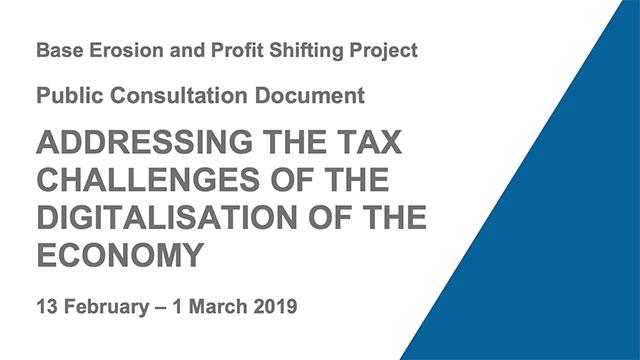The latest report by the OECD shows that officials are making progress toward a consensus on changing the global tax system.
The 127 OECD members have identified the challenges of the existing profit allocation and nexus rules. Currently, taxation of foreign companies depends on whether the firm has a permanent establishment (PE) in the country. Some of the IT giants have been able to avoid taxes by not having any PEs.
That has created two problems. One is that no matter how much money a firm earns in a foreign country, it will not contribute financially, at least not in the form of corporate tax.
The second is that domestic and foreign companies will not be on a level playing field. A domestic firm will need to pay corporate tax, while a foreign one won't. According to the European Commission, digitalized businesses face an effective tax rate of only 9.5 percent compared to 23.5 percent for traditional business models. On top of this, there is the issue of using tax havens to avoid further levies.
Countries have been talking about introducing a new international scheme to tax the tech firms. The Europeans have been pushing for a "GAFA tax," but the US has been firmly opposing it. China, home to Alibaba and Tencent, has also been cautious.
France and the UK decided that they could not wait any longer. They’ve announced the implementation of their own digital services tax until a new set of international tax rules are agreed.

Officials at the Japanese Finance Ministry and the OECD have been working hand-in-hand in an effort to speed up the work. The latest public consultation document released by the OECD on February 13th shows that countries have submitted different proposals to rewrite corporate tax rules on the back of a growing digital economy.
The UK has submitted what it calls the "user participation" proposal. The idea is to tax “highly digitalized businesses” such as social media platforms, search engines, and online marketplaces, similar to a GAFA tax. It’s based on the idea that soliciting the sustained engagement and active participation of users is a critical component of value creation.
To understand what that means, picture this: Mr. Tanaka residing in Tokyo writes on social media that he loves to travel and swim. Based on that, web advertisements for tour packages to Hawaii or the Maldives are sent to Tanaka. If he clicks the “Like” button, or decides to book one of those package tours, that’s “user participation.” The idea is to then count those clicks or sales country by country so that each country, including Japan in the case of Mr. Tanaka, can demand taxes from the companies.
The US has submitted what it calls the “marketing intangibles” proposal. It's intended to tax not only a subset of highly digitalized businesses, but a much broader range. Marketing intangibles include brand name, customer data and customer lists, and when they are used to derive profits from local consumers through marketing activities, a country can tax a company even if it does not have a physical presence there. That means countries with many consumers will get more tax revenue. Therefore, some experts point out that China and India may show interest in the US plan.
Pascal Saint-Amans, Director of the OECD Centre for Tax Policy and Administration, says that Washington’s position on digital tax reform has undergone a fundamental change. He adds that “the idea needs to be refined, but the proposal is pretty strong.”
The OECD paper touches on the commonalities between the ideas of the US and UK. It says both proposals are based on the principle that business profits should be taxed in the countries in which value is created, and that they will increase the share of business profit allocated to countries where users or customers are located.
The report reads, “A sharpened focus on the proposals’ shared foundation in value creation by businesses could facilitate the development of a unified approach.”
France and Germany have together submitted a proposal that addresses tax evasion. They say that countries with higher tax rates should be provided a right to “tax back” profits subject to zero or very low rates of taxation in tax havens. They also call for a coordination rule to mitigate the risk of double taxation.
The digital economy is changing the way people live and do business. Books and music can be downloaded without going to a bookstore. Big data derived from car navigation systems will be used to develop new self-driving technologies. Experts say that changing the international tax rules that fit the digital era is indeed the “work of the century.” Japan has a chance to take a leadership role in making this work as the country hosts the G20 meetings in June.

